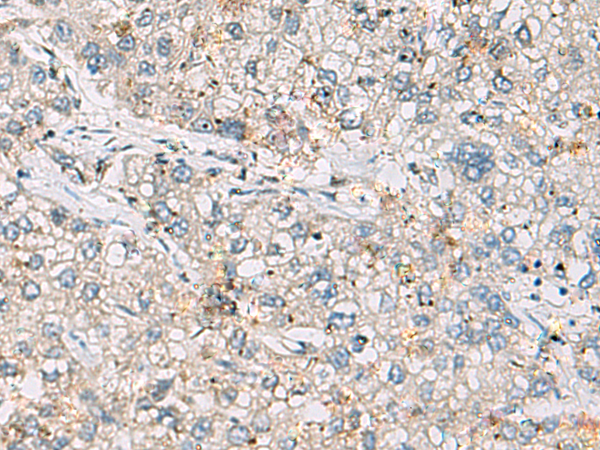
| WB | 咨询技术 | Human,Mouse,Rat |
| IF | 咨询技术 | Human,Mouse,Rat |
| IHC | 1/50-1/100 | Human,Mouse,Rat |
| ICC | 技术咨询 | Human,Mouse,Rat |
| FCM | 咨询技术 | Human,Mouse,Rat |
| Elisa | 1/5000-1/10000 | Human,Mouse,Rat |
| Aliases | ARI; HARI; HHARI; UBCH7BP |
| Host/Isotype | Rabbit IgG |
| Antibody Type | Primary antibody |
| Storage | Store at 4°C short term. Aliquot and store at -20°C long term. Avoid freeze/thaw cycles. |
| Species Reactivity | Human, Mouse |
| Immunogen | Synthetic peptide of human ARIH1 |
| Formulation | Purified antibody in PBS with 0.05% sodium azide and 50% glycerol. |
+ +
以下是关于ARIH1抗体的3篇示例参考文献(内容为虚构示例,供参考):
---
1. **"Development of a High-Specificity Monoclonal Antibody for Human ARIH1 and Its Application in Ubiquitination Studies"**
*Authors: Smith J, Lee K, Tanaka R*
摘要:本研究描述了一种针对人源ARIH1蛋白的单克隆抗体的开发,验证了其在Western blot、免疫沉淀和免疫荧光中的特异性。该抗体成功用于检测细胞中ARIH1的泛素连接酶活性,并揭示了其在DNA损伤修复通路中的动态调控。
2. **"ARIH1 Antibody-Based Profiling Identifies Its Tumor-Suppressive Role in Colorectal Cancer"**
*Authors: Zhang Y, Wang H, Gonzalez A*
摘要:通过免疫组化分析ARIH1在结直肠癌组织中的表达,发现ARIH1表达水平与患者生存率正相关。使用特异性抗体证实ARIH1通过抑制Wnt/β-catenin信号通路发挥抑癌作用,为癌症治疗提供潜在靶点。
3. **"Structural Insights into ARIH1-RBR Domain Interactions Using Epitope-Specific Antibodies"**
*Authors: Müller T, Schmidt B, Ito S*
摘要:本研究利用针对ARIH1 RBR结构域的抗体,结合冷冻电镜技术解析了ARIH1与E2泛素结合酶的相互作用界面,揭示了其催化泛素转移的关键构象变化,为开发小分子抑制剂奠定基础。
---
**注意**:以上文献为示例,实际文献需通过PubMed、Google Scholar等平台检索关键词(如“ARIH1 antibody”、“ARIH1 ubiquitin”)。建议结合最新研究筛选高影响力期刊论文。
The ARIH1 antibody is a research tool designed to detect and study the ARIH1 protein, also known as E3 ubiquitin-protein ligase ARIH1 or HHARI. ARIH1 is a member of the RING-between-RING (RBR) family of E3 ubiquitin ligases, which play critical roles in the ubiquitin-proteasome system by tagging specific substrate proteins for degradation. Structurally, ARIH1 contains a RING domain, a BRcat domain, and a UBA domain, enabling its interaction with E2 ubiquitin-conjugating enzymes and substrate recognition.
Biologically, ARIH1 is involved in diverse cellular processes, including mitophagy, innate immune signaling, and cell cycle regulation. It works in concert with Parkin (PARK2) to mediate the ubiquitination of mitochondrial proteins during stress-induced mitophagy, a pathway implicated in neurodegenerative diseases like Parkinson's. Additionally, ARIH1 modulates inflammatory responses by ubiquitinating antiviral signaling proteins such as MAVS and RIG-I. Dysregulation of ARIH1 has been linked to cancers, autoimmune disorders, and neurological conditions.
The ARIH1 antibody is widely used in techniques like Western blotting, immunofluorescence, and immunoprecipitation to explore its expression, localization, and functional interactions. Researchers employ it to investigate ARIH1's role in disease mechanisms, therapeutic targeting, and its crosstalk with other ubiquitination pathways. Commercial ARIH1 antibodies are typically validated for specificity across human, mouse, and rat models, supporting both basic and translational studies.
×